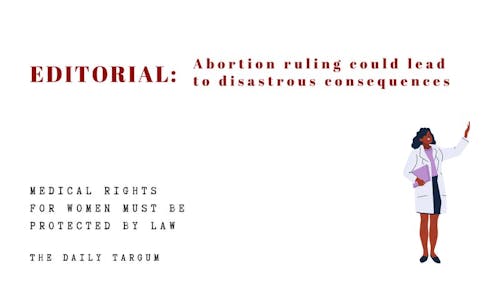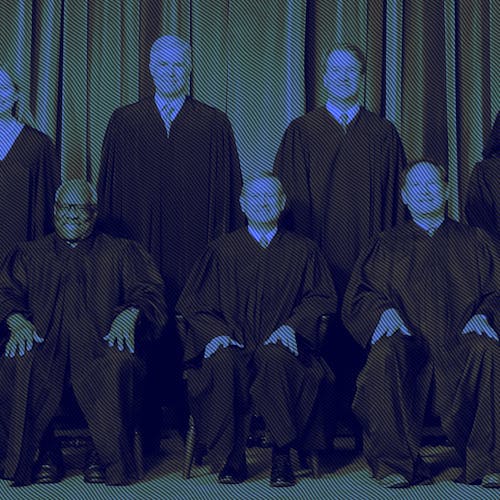EDITORIAL: Abortion ruling could lead to disastrous consequences

With the coronavirus disease (COVID-19) pandemic ravaging the world — and headlines — it is easy to lose track of other important news items.
But be wary. Times of crisis present themselves as perfect opportunities for officials to push for controversial legislation and we are seeing that in Texas right now. The Lone Star State is pushing to ban most abortions, and providers are appealing the decision to the U.S. Supreme Court — a troubling thing for sure.
“Abortion providers in Texas asked the Supreme Court on Saturday to let their clinics continue to perform some procedures after a federal appeals court temporarily upheld orders from state officials prohibiting most abortions,” according to The New York Times.
This potential Supreme Court decision will be critical for abortion rights across the nation. If the land’s highest judiciary perch decides in favor of Texas, states across the country will use it as precedent to enact similar restrictions on reproductive rights.
Regardless of your views on the ethics of abortion, it is smart to keep them legal. Studies show that abortion rates are similar between countries regardless of the procedure’s legality.
“If other countries are a guide, abortion restrictions won’t reduce the number of abortions that take place … abortion rates in countries where abortion is legal are similar to those in countries where it’s illegal. In parts of the world where abortion is illegal, botched abortions still cause about 8 to 11 percent of all maternal deaths, or about 30,000 each year,” according to The Atlantic.
That should be enough information for everyone to support the legality of abortion. If you do believe that it is immoral or it goes against your religious beliefs, opposing it as a right is counterproductive: The amount of abortions yearly will not change substantially and you would simply be adding to unnecessary deaths during childbirth. There is nothing moral about that.
But ethically speaking, there is nothing wrong about abortion and couples or women who decide to have the procedure done deserve no scorn in the eyes of society. The stigma around a completely safe medical act must die.
For instance, what is more ethical, a woman terminating her pregnancy or the government, equipped with the threat of law, forcing that woman to have the child? Forcing her to undergo the medical expenses and stresses that correspond with pregnancy? The answer is clearly the former.
With that line of thinking, banning abortion has horrible consequences. A racial disparity is present when it comes to those who decide to abort, and minority women often do not have the privilege that wealthier couples have. A rich person can simply leave the country to get an abortion if it is criminalized so outlawing it would impact people unequally.
“Although rates among Hispanic and African-American women have decreased along with the rest of the country, they remain significantly higher than the national average,” according to The Atlantic.
That article goes on to explain that the cause of that disparity stems from the systemic inequities between the races — mainly, poverty.
“ … money is often a decisive factor. The median wealth of white households is 18 times that of Hispanic households and 20 times that of Black households … but across the board, low-income women have a higher rate of unintended pregnancy and abortion regardless of race,” according to the article.
It is clear that criminalizing abortion is merely another attempt by the government to punish those of different races for being different races, punish the poor for being poor and punish women for being women. How can we be surprised when the opposite of all those groups are the ones that hold power in this nation?
Texas is doing the nation a disservice by bringing this to the Supreme Court, and though, with its current conservative majority, the court likely will not rule the ethical way, we must still demand that it does.
Additionally, more comprehensive, evidence-based measures to curtail abortion must be put in place, such as assuring that all communities have access to low-cost contraception and non-abstinence centered sexual education.
More institutionally, voting in leaders more sympathetic to the poor, to minorities and to women would help our Congress — which confirms court justices — gain perspective on reproductive issues, along with other systemic problems yet to be adequately addressed.
With the impacts of COVID-19, women's rights groups have their hands full. Their limited resources are stretched out even further, making it harder for them combat these restrictive laws. If you can, donate to help them.
We are not encouraging abortion, but it is unrealistic and cruel to outlaw it when women and families are given no other forms of support when they have a child under difficult or complicated circumstances.
Unfortunately, the government is using this time of crisis to sneak its terrible decisions and laws through, hoping the coronavirus will protect it from scrutiny. It is up to us to make sure that does not happen.
The Daily Targum's editorials represent the views of the majority of the 152nd editorial board. Columns, cartoons and letters do not necessarily reflect the views of the Targum Publishing Company or its staff.



